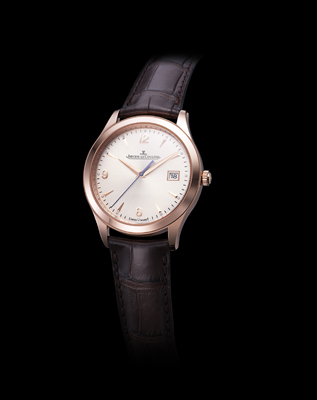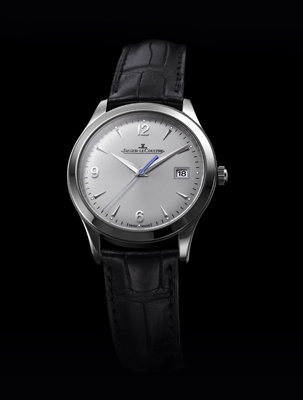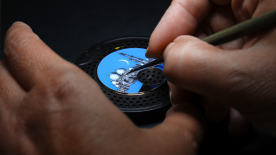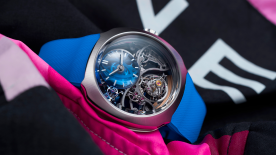Press release
At the SIHH 2012, the Manufacture Jaeger-LeCoultre presents three new timepieces in its Master Control line, which is celebrating its 20th anniversary. It was indeed in 1992 that the Grande Maison in the Vallée de Joux introduced this classically inspired line named after a merciless set of tests, the 1000 Hours Control, introduced that same year in order to guarantee the reliability, the sturdiness and the precision of its timepieces, even in the most extreme conditions.
Since 1833, watchmaking inventiveness has had a firm home base in the Vallée de Joux. That was the year the brilliant young Antoine Lecoultre founded his own establishment in Le Sentier, dedicated to the production of horological components. He had just developed a revolutionary machine designed to cut pinions, a key element of watch mechanisms. It represented a decisive breakthrough that paved the way for movement standardisation and series production. This first venture off the beaten track set an invaluable precedent, and remains an enduring source of inspiration for the founders' successors. Antoine LeCoultre did not take the success with which his first efforts were rewarded as an encouragement to rest on his laurels – quite the contrary. He extended production to encompass other timepiece components and constantly sought out new means of enhancing production quality. Barely ten years went by before he developed the millionometer, the first instrument capable of making micron-accurate measurements corresponding to one millionth of a metre. The invention was to have a considerable impact in that, as well as ensuring greatly improved precision, it also served to incorporate within pocket-watches certain horological complications that previous generations could only dream of. The new accomplishments generated great enthusiasm and the Vallée de Joux, the cradle of Fine Watchmaking, soon earned the nickname of the “Valley of Complications” – a title that has remained unchallenged ever since.
The 1000 Hours Control, 20 years ahead of its time
The inventions and improvements made by the Manufacture involve all aspects of watchmaking in order to raise the beauty, reliability and performances of its timepieces to new heights. Exactly two decades ago, in order to test the quality and sturdiness of its horological creations right down to the smallest details and in the most improbable conditions, Jaeger-LeCoultre instated a rigorous testing procedure, the 1000 Hours Control. Each watch in the new line unveiled that year was authorised to leave the workshops of the Manufacture only if accompanied by a certificate signed by the masterwatchmaker responsible for this procedure. The document duly certifies that the watch has valiantly surmounted the daunting trials stipulated by this six-week test programme. The models in the Master Control line reflect this demand for reliability in their very name. First introduced in 1992, this new generation of watches featured a design distinguished by the refinement of pure classical lines inspired by the grand tradition of 19th century pocket-watches, as well as by the legendary Memovox models and the Futurematic – the first entirely automatic watch with no winding crown. Nonetheless, their ability to withstand the most extreme conditions already stemmed from avantgarde technology. In an era when automatic timepieces generally set the frequency of their balances at 21,600 vibrations per hour, corresponding to 3 Hertz, Jaeger-LeCoultre Calibre 899/1 was distinguished by its high frequency of 4 Hertz, meaning 28,800 vibrations per hour – a characteristic that put it several steps ahead of other contemporary watch movements.
Who other than Jaeger-LeCoultre would have dreamed of being so ruthless with shiny new watches fresh off the production line? Just when it seemed they were ready to be slipped into precious presentation boxes and dispatched with all due care to their future owners, they found themselves instead in immaculate white lab rooms. These were the domain of the implacable Master Inspector, who presided over the smooth implementation of tests stretching over a full six-week period. At Jaeger-LeCoultre, timepieces are tested only once they are fully completed, just prior to departure from the Manufacture, and thus in their final form. Any discrepancy or any weakness detected during this month and a half is enough to ensure their instant return to the watchmaking workshops. The Master Inspector is inflexible in the exercise of his mission, as his own reputation – and even more importantly, that of the brand itself – depend on this unfailingly rigorous approach. Once received, each watch is thus subjected to a variety of tests: the cyclotest machine sets it into rotations punctuated by interruptions of various lengths, while other devices test its behaviour at various temperatures or verify its rating accuracy in six positions. Six weeks later, the Master Inspector finally gives the go-ahead by placing his signature on the certificate attesting to the fact that it possesses all the qualities required to become a loyal and greatly appreciated companion, day after day and year after year.
A new face for the Master Control's 20th anniversary
While values remain, their mode of expression changes subtly with time. Twenty years after its presentation and building on unflagging success, the Master Control reasserts its minimalist credo in a refined new interpretation. This creation, which continues to meet the strictest demands, now appears in a slightly smaller 39 millimetre diameter enabling it to adjust easily to all wrist sizes. It houses Jaeger-LeCoultre Calibre 899, which incorporates the latest developments to emerge from the company laboratories in the fields of resistance and robustness. Its face is even slimmer, the bezel is sleeker than ever and the delicately curving lugs extend harmoniously towards the strap. Sharing the same aspiration to purity, the functions also meet the same criteria of usefulness and are expressed on the sunburst silver-toned dial by Dauphine hands indicating the hours and minutes, along with a baton-type seconds hand. The applied hour-markers continue to make way for Roman numerals at three of the dial's four cardinal points (6, 9 and 12 o'clock), while the date window appears at 3 o'clock in the location traditionally symbolising sunrise. In its steel or pink gold versions, the Master Control embodies elegance raised to authentic excellence in order to illustrate a mechanical perfection and an aesthetic refinement that will only be enhanced by the passing of time.

Master Ultra Thin Réserve de Marche, a minimalist credo
The Ultra Thin models enrich the legendary reliability and minimalist aesthetic of the Master line with a new feat: the extreme slenderness of its technical execution. In its 39 mm-diameter case, the Master Ultra Thin Réserve de Marche expresses a horological philosophy based on reducing functions and their representation to absolute essentials. There are no fancy touches in terms of either form or content. The Jaeger-LeCoultre automatic Calibre 938 possesses all the attributes of a high-precision mechanism, with its high 4 Hertz frequency and its 43-hour power reserve. While endowed with the proverbial sturdiness of Jaeger-LeCoultre movements, it nonetheless complies with the wishes of the designers, the horological architects who requested the movement design engineers to keep it as thin as possible. The result certainly lives up to expectations with a calibre measuring a mere 4.9 millimetres. Those responsible for its outward form were thus able to fit it inside a svelte case entirely in tune with the overall minimalist approach, since the overall thickness amounts to barely 9.85 millimetres.
Connoisseurs who appreciate wearing a work of art endowed with exemplary precision on their wrist were quick to appreciate the feat it represents, and they accordingly raised the Master Ultra Thin Réserve de Marche to the rank of bestseller within the Master Control line. In 2012, this creation dedicated to slenderness pursues its quest for essentials. The lugs are sleeker, the profile is sharper, and the dial is even more readable thanks to the new dial diameter. Yet the heart of the watch remains intact and perfectly preserved with a display mode ensuring immediate read-off of clear, self-evident functions that are useful in everyday life. These naturally includes the hours and minutes, shown by applied hour-markers swept over by Dauphine-type hands, small seconds in a subdial at 8 o'clock, the indispensable power reserve providing a reliable indication that the mechanism requires winding via the crown, along with a pointer-type date display on the opposite side. Each indication has its own space to enable easy consultation and avoid any confusion. What more could one ask of a watch ready to provide such precious services for decades to come? There may be just one tiny moment of hesitation: that sensed by a devotee of fine watchmaking when choosing between a steel version with a sunburst silver-toned dial, and a pink gold model featuring a delicate eggshell-white face.
Master Ultra Thin Tourbillon, the hegemony of the tourbillon
The pink gold case frames a dial on which the observer's gaze is inexorably drawn towards the tourbillon at 6 o'clock. This imposing and majestic device testifies to the exceptional precision of the Master Ultra Thin Tourbillon, as well as to the inventive strength of the Manufacture that propelled the tourbillon, invented in the latter years of the 18th century, firmly into the 21st century. In 2004, the Gyrotourbillon caused a sensation by introducing the world's first spherical tourbillon. Four years later, the Grande Maison in the Vallée de Joux unveiled the Reverso Gyrotourbillon, the first three-dimensional tourbillon to feature a cylindrical balance-spring. Barely twelve months later, Jaeger-LeCoultre presented the Master Grande Tradition Grande Complication combining a flying tourbillon and celestial indications in the form of a sidereal zodiac calendar. This extraordinary range of inventions is of course anything but coincidental.
Six years ago, the Master Tourbillon returned to the roots of the tourbillon, of which the primary function consists in optimising the precision and the reliability of a timepiece by compensating for the detrimental effects of gravity on the regulating organ. Its tourbillon is distinguished by its generous dimensions and its high frequency of 28,800 vibrations per hour, which remains a rarity for a tourbillon movement. It also features a diaphanously light titanium carriage weighing a mere 0.33 grams and representing an undeniable asset in reducing the energy required by a barrel that is wound by a rotor mounted on ceramic ball bearings. This high-precision instrument won first prize in the Chronométrie 2009 international timing competition.
In 2012, the Master Ultra Thin Tourbillon featuring this same tourbillon is an anthem of praise to this prestigious device. In this stupendously slender execution, it is held by a filigree-worked bridge providing an exquisite view of its perfectly proportioned orbit. Set against an eggshell-white dial, the applied pink gold hour-markers retain the modesty required to avoid distracting the gaze from the true focus of attention. The gold hour and minute (voir FR, seconde??) hands accompany the small seconds at 6 o'clock which, interdependent with the rotations of the tourbillon, performs a complete turn once a minute. The result of decades of patient research and development appears in a state of perfection and simplicity such that no one admiring it could possibly imagine the efforts involved in making it. This is indeed the hallmark of all authentic masterpieces. In homage to this artistic and technological accomplishment, the Manufacture Jaeger-LeCoultre will offer the Master Ultra Thin Tourbillon exclusively with a pink gold case measuring 40 mm in diameter and measuring an incredible thin 11.3 millimetres.
Throughout its rich history, Jaeger-LeCoultre's inventiveness has been attested by the filing of almost 400 patents. More eloquently than any other, this statistic illustrates the tirelessly innovative momentum of the Manufacture, although it only takes on its true significance when one recalls that 80 of them have been awarded for decisive breakthroughs made since the dawn of the third millennium. For the Grande Maison in the Vallée de Joux, the acceleration of history is no mere myth.
For twenty years, the strict demands of the 1000 Hours Control have been conducting rigorous test procedures on all Master Control models, which embody the latest developments stemming from the research undertaken in the Manufacture's laboratories. For two decades, the performances and the reliability of the timepieces in the Master Control line have been enthusiastically welcomed by the public and by horological experts who salute their avant-garde technology. In 2012, three new timepieces celebrate a watch line that has truly come of age. Each expresses a particular aspect of the vast range of expertise cultivated within the Manufacture Jaeger-LeCoultre: prodigious horological classicism conveyed through a minimalist expression radiating breathtaking beauty; a contemporary expression of the power reserve in an ultra-thin case; and a tourbillon featuring a slenderness that is an outstanding feat in its own right.
Master Control: technical characteristics
Movement
• mechanical automatic Jaeger-LeCoultre Calibre 899
• 28,800 vibrations per hour
• 43-hour power reserve
• 219 parts
• 32 jewels
• 3.30 mm thick
• 26 mm in diameter
Functions
• hours, minutes, seconds, date
Dial
• sunburst silver-toned
• applied hour-markers
Hands
• hours and minutes : dauphine type
• seconds : baton type with counterweight
Crown
• 1 crown to wind the watch as well as to adjust the hours, minutes and the date
Case
• ø 39 mm, thickness : 8.5mm
• 18-carat pink gold or steel
• sapphire crystals front and back
• water resistance : 5 bar
Straps
• chocolate-toned alligator leather with 18-carat gold pin buckle
• black alligator leather with steel folding clasp
Reference
• Q1542520, 18-carat pink gold
• Q1548420, steel
Master Ultra Thin Réserve de Marche: technical characteristics
Movement
• mechanical automatic Jaeger-LeCoultre Calibre 938
• 28,800 vibrations per hour
• 43-hour power reserve
• 273 parts
• 41 jewels
• 4.9 mm thick
• 26 mm in diameter
Functions
• hours, minutes, small seconds, date and power reserve
Dial
• eggshell-white and sunburst silver-toned
• applied numerals
Hands
• hours and minutes: dauphine type
• date and power reserve: leaf type
• seconds: baton type
Crowns
• 1 crown to wind the watch as well as to adjust the hours and minutes
• 1 push-piece to set the date
Case
• ø 39 mm, thickness : 9.85 mm
• 18-carat pink gold or steel
• sapphire crystals front and back
• water resistance : 5 bar
Straps
• chocolate-toned alligator leather with 18-carat gold pin buckle
• black alligator leather with steel folding clasp
Reference
• Q1372520, 18-carat pink gold
• Q1378420, steel
Master Ultra Thin Tourbillon: technical characteristics
Movement
• mechanical automatic Jaeger-LeCoultre Calibre 982
• 28,800 vibrations per hour
• 48-hour power reserve
• 262 parts
• 33 jewels
• 6.4 mm thick
• 30 mm in diameter
Functions
• hours, minutes, small seconds
• tourbillon
Dial
• eggshell-white
• pink gold appliques
Hands
• hours and minutes : type dauphine
• seconds : baton type
Crown
• 1 crown to wind the watch, as well as to adjust the hours and minutes
Case
• ø 40 mm, thickness : 11.3 mm
• 18-carat pink gold
• sapphire crystal, cambered with a glareproofed exterior on the dial side
• water resistance : 5 bar
Strap
• chocolate-toned alligator leather with 18-carat gold pin buckle
Reference
• Q1322510, 18-carat pink gold






